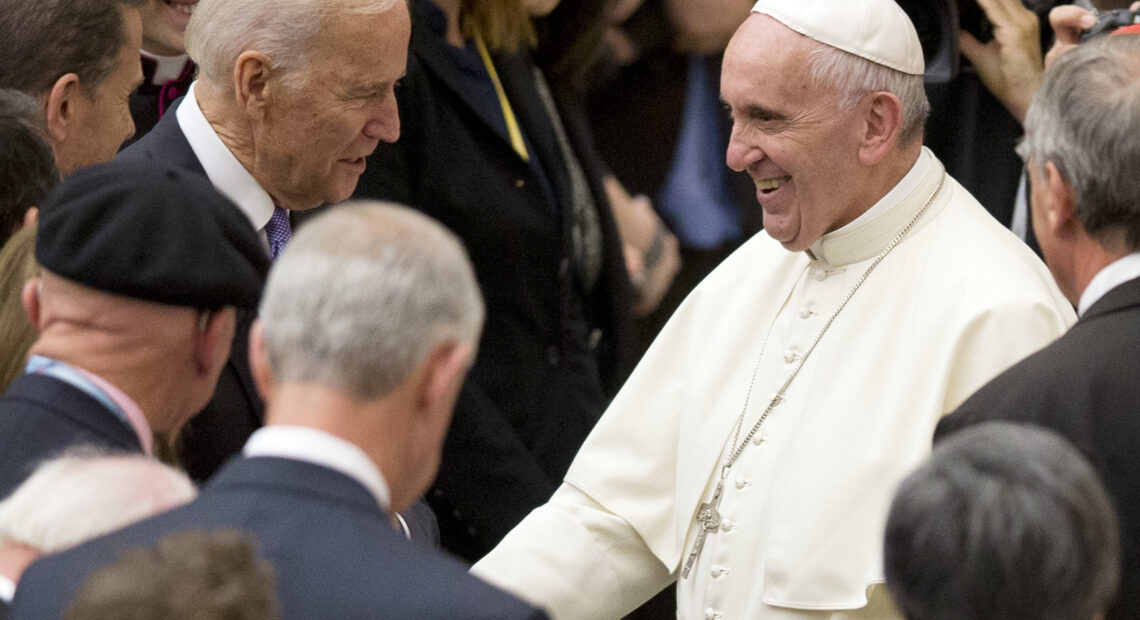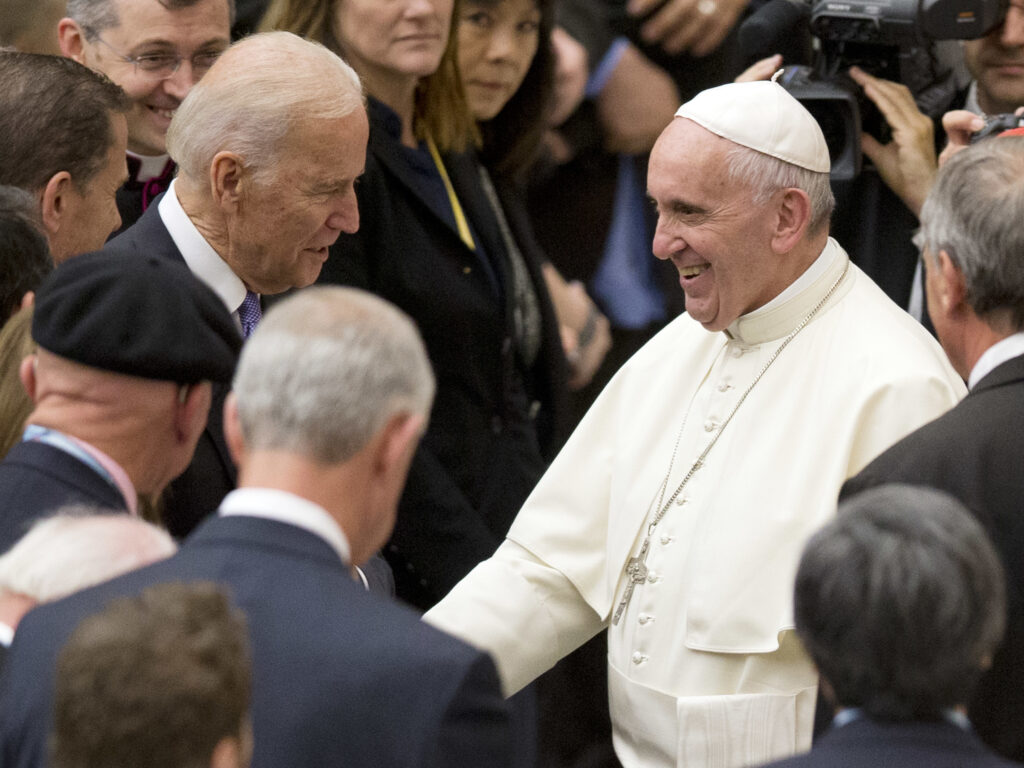
In Pope Francis, Biden Has A Potential Ally — Who Shares The Same Catholic Detractors
LISTEN
BY SYLVIA POGGIOLI
ROME — The second Roman Catholic president in American history is a devout man who makes no secret of the importance of faith in his life. President Joe Biden is a regular churchgoer, often quotes St. Augustine and carries a rosary that belonged to his late son Beau. In one of the first images released of him in the Oval Office, a photo was visible behind his desk showing him with Pope Francis.
The Argentine-born pope and the new American president have both staked out liberal stances on issues like climate change and economic disparity, and have taken different positions from their “culture warrior” predecessors.
Biden diametrically differs from former President Donald Trump in his support for a more inclusive society, on issues ranging from immigration and health care to LGBTQ equality. Francis has moved away from Pope John Paul II’s and Benedict XVI’s emphasis on sexual morality, preferring to focus on social justice and the rights of the poor and marginalized. He has repeatedly lashed out at what he describes as the destructive effects of laissez-faire capitalism on society and the environment.

Pope Francis shakes hands with Joe Biden, then vice president, at the Vatican, in 2016. CREDIT: Andrew Medichini/AP
The pope and the president have a lot in common, says Paul Elie, a scholar of Catholicism at Georgetown University.
“Their informality, the fact that they were elected late in life, the fact that they seem to take issues as they come, listening, discerning and then acting,” he says. “And both of them, I think, have surprised their people by turning out to be more progressive than was expected.”
In the November election, just over half of American Catholics voted against Biden, in great part because of his support for laws such as those guaranteeing abortion rights that run contrary to Church doctrine.
Nevertheless, the new president has a friend — and potential ally — at the Vatican. On Inauguration Day, Pope Francis sent Biden a warm note saying, “Grave crises facing our human family call for farsighted and united responses.”
Relations between Pope Francis and Trump were at best chilly. When Trump was still a candidate in 2016, Pope Francis suggested he was “not a Christian” for his campaign vow to deport more immigrants and build a wall along the border with Mexico. A year later, the pope wondered how Trump could claim to be “pro-life” while ordering policies that broke up the families of immigrants and asylum seekers.
Biden’s election was welcomed by the Vatican — but without mention of his support for abortion rights, says Villanova University theology professor Massimo Faggioli.
“It’s clear that they see this moment as a return to some sanity. This is what the Vatican really holds dear,” says Faggioli, “so that that there is a predictability in the relations between countries and leaders.”
Faggioli, the author of Joe Biden and Catholicism in the United States, argues that under the influence of the previous two papacies, the U.S. Catholic Church leadership became increasingly traditionalist, ignoring any discourse on racism, rule of law or voting rights — and has thus become more closely allied with the political right.
He points out that Biden and the pope share the same detractors among American Catholic leaders — the United States Conference of Catholic Bishops, which he says “is dominated by ultraconservative Catholic bishops whose political sympathies lie very clearly with the Republican Party, and not just on the abortion issue.”
The Vatican was reportedly annoyed by a bishops’ conference statement on Inauguration Day. Signed by the group’s leader, Archbishop José H. Gomez, the statement lamented that “our new President has pledged to pursue certain policies that would advance moral evils and threaten human life and dignity, most seriously in the areas of abortion, contraception, marriage, and gender.” It added that “for the nation’s bishops, the continued injustice of abortion remains the preeminent priority.”
An unnamed senior Vatican official told the Catholic publication America, “It is most unfortunate and is likely to create even greater divisions within the Church in the United States.”
“So, there is an extremist wing of the Catholic Church,” says Faggioli, “which is a handful of bishops, but a bigger chunk of the clergy.”
For example, last August, the Rev. James Altman of La Crosse, Wisc., posted a video to YouTube in which he proclaimed, “You cannot be Catholic and be a Democrat, period. Their party platform absolutely is against everything the Catholic Church teaches. Repent of your support of that party and its platform or face the fires of hell.” It has been viewed more than a million times.
Not all conservative Catholics strike such an apocalyptic tone toward Democrats. But many share a message of condemnation.
In a podcast last month with the Ethics and Public Policy Center, a conservative think tank, George Weigel, an author and political analyst who has written extensively about the Catholic Church, said the new president seems quite sincere in his personal piety. But he went on to attack Biden, saying he “facilitates grave moral evils. Mr. Biden is an incoherent Catholic and incoherent Catholics should not be presenting themselves for Holy Communion as if they were living in full communion with the church.”
As both Francis and Biden ignore their Catholic critics, presidential historian Timothy Naftali sees potential parallels now with a period at the peak of the Cold War six decades ago.
Six months after the Cuban Missile Crisis brought the world to the precipice of nuclear annihilation in 1962, Pope John XXIII issued the Pacem in Terris encyclical. Addressed not just to Catholics but to all people “of good will,” it called for peacemaking through negotiation.
A week later, President John F. Kennedy cited the document in a major speech, and was subsequently able to win domestic support for a nuclear test ban treaty with the Soviet Union.
Naftali believes the pope and Biden could join forces against climate change — the great threat facing humanity today.
“Given the prominence of Pope Francis on this issue, the fact that he has identified climate change as an existential threat,” says Naftali, “there is a natural partnership with a secular leader who has also identified climate change as an existential threat. These are two leaders powerful in different realms. That’s an opportunity. And it’s not an opportunity that comes every generation.”
Naftali is convinced that amid so much disinformation on the coronavirus pandemic and vaccines, these two prominent Catholics could also work together to convince more people that science and faith are not mutually exclusive.















